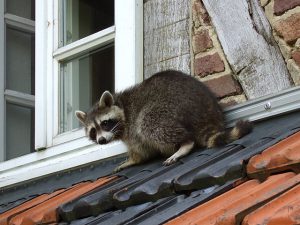
11 May Raccoons
 The increasing number of raccoons in urban areas has resulted in diverse reactions in humans, ranging from outrage at their presence to deliberate feeding.Some wildlife experts and most public authorities caution against feeding wild animals because they might become increasingly obtrusive and dependent on humans as a food source.Other experts challenge such arguments and give advice on feeding raccoons and other wildlife in their books.Raccoons without a fear of humans are a concern to those who attribute this trait to rabies, but scientists point out this behavior is much more likely to be a behavioral adjustment to living in habitats with regular contact to humans for many generations.Raccoons usually do not prey on domestic cats and dogs, but individual cases of killings have been reported.Attacks on pets may also target their owners.
The increasing number of raccoons in urban areas has resulted in diverse reactions in humans, ranging from outrage at their presence to deliberate feeding.Some wildlife experts and most public authorities caution against feeding wild animals because they might become increasingly obtrusive and dependent on humans as a food source.Other experts challenge such arguments and give advice on feeding raccoons and other wildlife in their books.Raccoons without a fear of humans are a concern to those who attribute this trait to rabies, but scientists point out this behavior is much more likely to be a behavioral adjustment to living in habitats with regular contact to humans for many generations.Raccoons usually do not prey on domestic cats and dogs, but individual cases of killings have been reported.Attacks on pets may also target their owners.
While overturned waste containers and raided fruit trees are just a nuisance to homeowners, it can cost several thousand dollars to repair damage caused by the use of attic space as dens.Relocating or killing raccoons without a permit is forbidden in many urban areas on grounds of animal welfare. These methods usually only solve problems with particularly wild or aggressive individuals, since adequate dens are either known to several raccoons or will quickly be rediscovered.Loud noises, flashing lights and unpleasant odors have proven particularly effective in driving away a mother and her kits before they would normally leave the nesting place (when the kits are about eight weeks old). Typically, though, only precautionary measures to restrict access to food waste and den sites are effective in the long term.
Among all fruits and crops cultivated in agricultural areas, sweet corn in its milk stage is particularly popular among raccoons. In a two-year study by Purdue University researchers, published in 2004, raccoons were responsible for 87% of the damage to corn plants. Like other predators, raccoons searching for food can break into poultry houses to feed on chickens, ducks, their eggs, or food.
Since raccoons in high mortality areas have a higher rate of reproduction, extensive hunting may not solve problems with raccoon populations. Older males also claim larger home ranges than younger ones, resulting in a lower population density.
